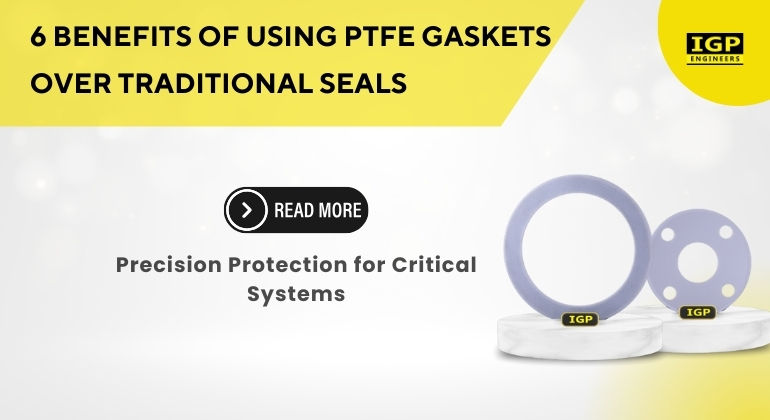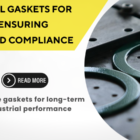Introduction
Stop dealing with seal failures, frequent leaks, and costly maintenance. IGP’s PTFE gaskets solve the most common sealing problems that plague industrial operations. Our advanced polytetrafluoroethylene gaskets deliver superior chemical resistance, exceptional durability, and food-safe performance that traditional rubber and metal seals simply can’t match.
PTFE Gaskets Benefits Summary:
- Zero seal failure in extreme heat and aggressive chemicals
- Leak-proof performance that eliminates costly downtime
- 5x longer lifespan than traditional gaskets
- FDA-approved materials safe for food and pharmaceutical applications
- 75% reduction in maintenance costs
While traditional seals such as rubber, silicone, and fiber gaskets have been used for decades, they often fall short in environments that demand superior performance. This is where PTFE gaskets(teflon gaskets) have emerged as a preferred alternative across many industries.
As one of the leading PTFE gasket suppliers in India, IGP Engineers brings this comprehensive guide to help you understand the 6 key benefits of using PTFE gaskets over traditional sealing materials.
What is PTFE Gaskets and Where is it Used?
Polytetrafluoroethylene (PTFE) is a synthetic fluoropolymer known for its exceptional non-stick properties and chemical inertness. Originally developed for aerospace applications, PTFE has become the gold standard for sealing solutions in demanding industrial environments.
IGP’s PTFE gaskets are engineered for critical applications across multiple industries including chemical processing plants, pharmaceutical manufacturing facilities, food and beverage production, oil and gas operations, and semiconductor fabrication. Wherever traditional seals fail due to chemical attack, temperature extremes, or contamination concerns, PTFE gaskets provide a reliable solution.
Benefits of PTFE Gaskets(Teflon Gaskets)
Here are 6 key advantages of PTFE gaskets, including superior durability, chemical resistance, and temperature tolerance over conventional seals.
1. Superior Chemical Resistance
One of the most prominent advantages of PTFE gaskets is their exceptional chemical resistance. Unlike rubber or fiber gaskets, which may degrade or swell when exposed to harsh acids, bases, and solvents, PTFE remains chemically inert in almost every industrial environment.
Why it matters:
- Traditional gaskets tend to lose elasticity and structural integrity in aggressive media, causing leaks or failures.
- PTFE gaskets are ideal for chemical processing, pharmaceuticals, and oil & gas applications, where unpredictable exposure to corrosive substances is common.
This level of chemical resistance not only extends the life of the gasket but also reduces replacement frequency, offering long-term cost efficiency.
2. Wide Temperature Range Tolerance
In applications involving extreme heat or cryogenic temperatures, PTFE gaskets offer a significantly wider temperature range compared to traditional gaskets. PTFE can typically withstand temperatures from -200°C to +260°C, maintaining its sealing properties without becoming brittle or losing shape.
Comparative Insight:
- Rubber gaskets typically degrade around 120°C.
- Fiber gaskets may char or deform at high temperatures.
- PTFE remains stable and performs reliably under extreme thermal stress.
This makes PTFE the go-to choice for high-temperature sealing in steam pipelines, boiler systems, and thermal reactors where traditional seals often fail.
3. Low Friction and Non-Stick Surface
PTFE, widely known by its commercial name Teflon, is renowned for its low coefficient of friction. This makes PTFE gaskets particularly beneficial in dynamic sealing applications where parts are in motion or where sticking between surfaces is a concern.
Benefits at a glance:
- Non-stick surface prevents the gasket from adhering to the flange or joint surface.
- Easy to remove and replace during routine maintenance.
- Reduces wear and tear on mating surfaces.
PTFE gasket benefits in this area are especially useful in food processing and beverage industries, where hygiene and easy disassembly are key operational requirements.
4. Long-Term Durability and Low Maintenance
The inert and stable structure of PTFE allows it to resist weathering, UV exposure, oxidation, and thermal cycling, all of which are common causes of gasket failure in traditional seals.
Traditional gasket issues:
- Rubber hardens or cracks over time.
- Fiber gaskets absorb moisture and disintegrate.
- Silicone may become brittle with continuous exposure to fluctuating temperatures.
In contrast, non metallic PTFE gaskets offer:
✔️ Excellent dimensional stability
✔️ Resistance to aging
✔️ Minimal need for replacements or adjustments
✔️ Best gasket for harsh environments
Note: The above factors directly translate into lower maintenance costs and less downtime, which is a major advantage for any industrial operation looking to optimize performance and efficiency.
5. Versatility Across Industries
One of the most overlooked yet crucial PTFE gasket benefits is its wide compatibility with different industries and systems. Thanks to its non-toxic, non-reactive, and FDA-compliant properties, PTFE can be safely used in both industrial and sanitary applications.
Applications of PTFE Gaskets:
- Chemical processing – for resistance against aggressive media
- Pharmaceuticals – ensuring zero contamination
- Food & beverage – thanks to FDA and EU certifications
- Water treatment – due to non-leaching properties
- Semiconductor manufacturing – for ultra-clean environments
Compared to traditional sealing materials, PTFE gaskets provide a universal sealing solution, reducing the need for industry-specific variants and simplifying procurement.
6. Excellent Electrical and Thermal Insulation
In industries dealing with electrical enclosures, transformers, or sensitive electronic equipment, the choice of gasket must also consider insulation properties. PTFE has naturally low electrical conductivity, making it an excellent dielectric material.
Where traditional materials fall short:
- Rubber and fiber gaskets may not provide sufficient insulation in high-voltage areas.
- Silicone can degrade under high thermal or electrical stress.
PTFE gaskets, on the other hand:
- Resist electrical interference
- Withstand thermal buildup
- Prevent short circuits or arcing
This makes them the preferred option in electrical panel sealing, telecom towers, and energy systems where dual sealing and insulation are required.
PTFE Gaskets vs Traditional Gaskets: Comparison Table
|
Feature |
PTFE Gaskets |
Traditional Seals (Rubber/Fiber) |
|
Chemical Resistance |
Excellent | Moderate to Poor |
|
Temperature Tolerance |
-200°C to +260°C |
-20°C to +120°C |
|
Maintenance Requirements |
Low |
High |
|
Friction/Stickiness |
Very Low (non-stick) |
Moderate to High |
|
Durability |
5–10 years or more |
1–3 years |
|
Food/Pharma Compliance |
FDA-approved |
Usually not compliant |
|
Electrical Insulation |
Excellent |
Variable |
Why Choose IGP Engineers for Gasket Solutions?
As one of most trusted PTFE gasket suppliers in India, IGP Engineers offers:
- Custom-manufactured PTFE(teflon gaskets) tailored to your application
- Technical consultation for material selection
- Compliance with international safety and quality standards
- Fast delivery and consistent support
Our engineering and R&D teams work closely with clients across sectors to deliver high-performance industrial sealing solutions that are cost-effective, reliable, and long-lasting.
Whether you’re replacing worn-out traditional seals or designing a new system, our PTFE gaskets can be your performance upgrade.
Final Thoughts
Industrial operations demand materials that can withstand aggressive conditions without compromising on safety or performance. PTFE gaskets stand out for their superior chemical resistance, temperature stability, low maintenance, and multi-industry versatility.
If you are still relying on conventional gaskets that degrade under pressure, literally it is the right time to upgrade your sealing strategy.
Partner with IGP Engineers to source high-quality PTFE gaskets that outperform traditional seals and bring long-term value to your operations.
Frequently Asked Questions
1. What makes PTFE gaskets better than rubber or fiber gaskets?
PTFE gaskets offer superior chemical resistance, wider temperature tolerance, non-stick properties, and longer service life compared to rubber or fiber gaskets.
2. In which industries are PTFE gaskets commonly used?
PTFE gaskets are widely used in chemical processing, pharmaceuticals, food and beverage, oil & gas, water treatment, and electronics industries.
3. Can PTFE gaskets handle high temperatures and pressures?
Yes, PTFE gaskets can withstand temperatures from -200°C to +260°C and perform well under high-pressure sealing applications.
4. Are PTFE gaskets safe for food and pharmaceutical use?
Absolutely. PTFE is FDA-approved and non-toxic, making it suitable for hygienic applications in food, beverage, and pharmaceutical industries.
5. How long do PTFE gaskets typically last?
With proper installation and usage, PTFE gaskets can last 5–10 years or more, significantly outlasting traditional sealing materials.






